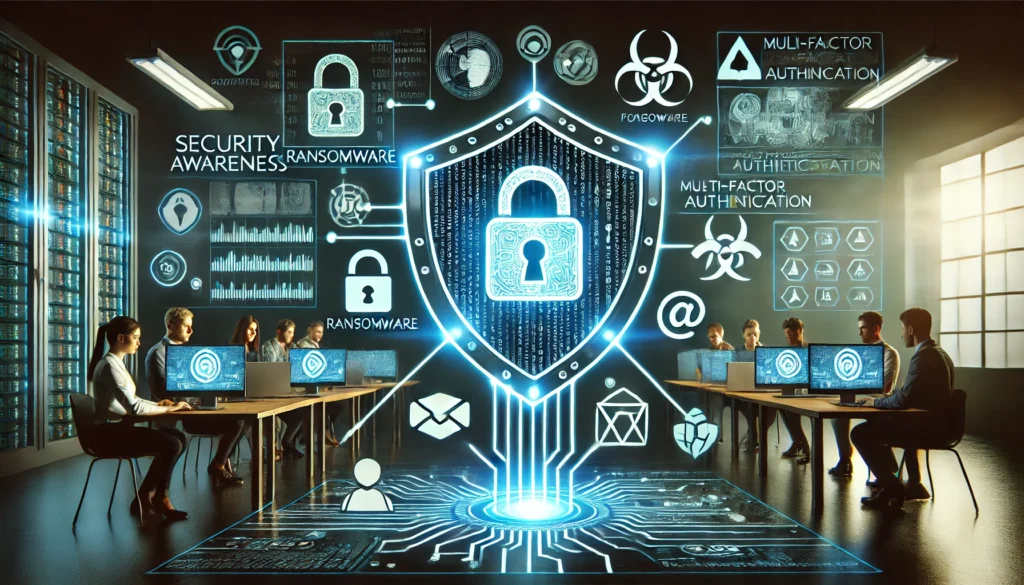Key Takeaways
- Understanding how ransomware and phishing attacks target small businesses.
- Techniques to protect your company from online attacks.
- Importance of employee training and advanced security solutions.
Table of Contents
- Understanding Cyber Threats
- Impact on Small Businesses
- Preventive Measures
- Importance of Employee Training
- Advanced Security Solutions
- Conclusion
Preventing ransomware and phishing attacks requires proactive cybersecurity strategies. Start by educating employees on identifying phishing emails and avoiding suspicious attachments or links. Regularly update software, operating systems, and antivirus programs to patch vulnerabilities that hackers might exploit. Implement multi-factor authentication (MFA) to add an extra layer of protection for login credentials. Use strong password policies, ensuring unique and complex passwords for each account. Protect confidential information using encryption to prevent unwanted access, and make regular backups to reduce loss in the event of an attack. Firewalls and email filtering systems should also block malicious content before it reaches users. Monitoring network traffic and employing intrusion detection systems will help detect and prevent potential threats before they can cause harm.
Understanding Cyber Threats
Ransomware and phishing attacks are two of the most pervasive cyber threats facing small businesses today. Ransomware involves hackers encrypting a company’s data and demanding payment for its release. Phishing tricks employees into providing sensitive information via deceptive emails, often appearing to come from legitimate sources. To safeguard against ransomware hacks using Fortinet’s solution, businesses need to integrate thorough defensive measures and take a proactive approach to cybersecurity. These cyber-threats continually evolve, employing more sophisticated methods that make them harder to detect and combat. Understanding how these attacks work is the first step in devising effective defenses.
Impact on Small Businesses
Cyberattacks can be devastating for small businesses. According to a recent report, ransomware attacks are increasing globally, causing significant financial and operational disruptions. Small companies, often with limited resources, are particularly vulnerable. The immediate effects include substantial economic losses due to ransom payments, the costs of restoring compromised systems, and the potential loss of client trust. Small businesses are more likely to be targeted because they typically have fewer defenses and can be seen as easy targets. Longer-term consequences for these businesses include a tarnished reputation, which can result in lost customers and decreased revenue. Compared to more prominent companies, small enterprises may need more financial padding and solid systems necessary for a speedy recovery from such accidents, making recovery particularly challenging.
Preventive Measures
Preventing ransomware and phishing attacks requires a comprehensive and proactive cybersecurity strategy. Organizations and individuals alike must employ a combination of technological tools, security protocols, and ongoing education to defend against these ever-evolving threats. Utilizing robust firewalls, antivirus software, and advanced encryption techniques helps create a solid security foundation, preventing unauthorized access and protecting sensitive data. Strong password policies and two-factor authentication are essential safeguards, making it harder for cybercriminals to breach systems.
Employee training is crucial in this defense strategy, ensuring staff can recognize phishing attempts, malicious links, or suspicious emails. Regular cybersecurity awareness sessions keep teams informed about the latest attack methods. Data backups are another vital precaution—frequent backups ensure that valuable data can be restored quickly without paying ransom if ransomware strikes.
Moreover, businesses should regularly update their systems, software, and security patches to fix vulnerabilities. Organizations can significantly reduce risks and maintain operational security by avoiding cybercriminal tactics.
Importance of Employee Training
Human error remains a significant risk in cybersecurity. Training employees to recognize phishing emails and not click on suspicious links is crucial. Regular drills and updates on new threats can make a big difference. For example, a recent article highlights effective methods for preventing ransomware through employee awareness. Ensuring employees understand the severe consequences of cyber threats and know their role in protecting the company is essential. Continuous education and awareness programs can significantly lower the chances of a successful attack. Effective training programs should cover identifying fraudulent communications, safe internet practices, and promptly reporting suspicious activities. Regularly engaging employees with real-life simulation exercises can also help cement their learning and prepare them for potential cybersecurity incidents.
Advanced Security Solutions
Investing in advanced security solutions can substantially decrease the risk of cyberattacks. Endpoint protection, intrusion detection, and managed security services provide comprehensive protection. Small firms should assess their unique requirements and select solutions that provide the best security for the money. Modern security solutions provide real-time monitoring and automated incident response capabilities that help detect and mitigate threats before they can cause harm. Furthermore, utilizing AI and machine learning technology can improve threat identification and reaction times, giving a vital advantage in the continuous fight against cyberattacks. These technologies can swiftly analyze Large volumes of data, allowing them to spot suspicious patterns and possible dangers earlier than conventional techniques.
Conclusion
Preventing ransomware and phishing attacks requires a proactive, multi-layered approach to cybersecurity. Businesses and individuals must prioritize implementing strong defenses like firewalls, antivirus software, and encryption. As an additional layer of security, safe password practices and two-factor authentication are crucial for identifying and thwarting phishing attacks. Regular staff training is also necessary. Regular data backups are critical in mitigating the damage from a ransomware attack, ensuring minimal disruption to business operations. Staying vigilant and updating security systems regularly keeps defenses updated with evolving threats. By taking these steps, organizations can significantly reduce their exposure to cyber risks, safeguarding sensitive data and business continuity. Proactive prevention measures protect against immediate attacks and strengthen long-term resilience in the face of emerging cybersecurity threats.







